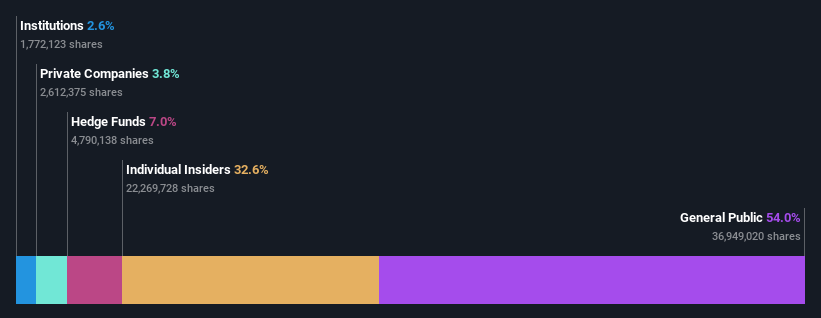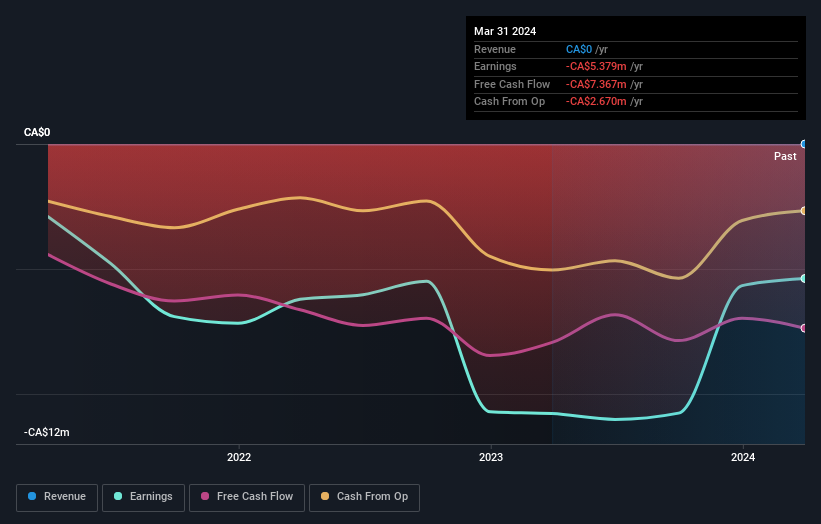- Canada
- /
- Metals and Mining
- /
- TSXV:CKG
Chesapeake Gold Corp. (CVE:CKG) surges 11%; individual investors who own 54% shares profited along with insiders

Key Insights
- Significant control over Chesapeake Gold by individual investors implies that the general public has more power to influence management and governance-related decisions
- The top 15 shareholders own 46% of the company
- Insiders have been buying lately
A look at the shareholders of Chesapeake Gold Corp. (CVE:CKG) can tell us which group is most powerful. The group holding the most number of shares in the company, around 54% to be precise, is individual investors. In other words, the group stands to gain the most (or lose the most) from their investment into the company.
Following a 11% increase in the stock price last week, individual investors profited the most, but insiders who own 33% stock also stood to gain from the increase.
In the chart below, we zoom in on the different ownership groups of Chesapeake Gold.
Check out our latest analysis for Chesapeake Gold

What Does The Institutional Ownership Tell Us About Chesapeake Gold?
Institutions typically measure themselves against a benchmark when reporting to their own investors, so they often become more enthusiastic about a stock once it's included in a major index. We would expect most companies to have some institutions on the register, especially if they are growing.
Since institutions own only a small portion of Chesapeake Gold, many may not have spent much time considering the stock. But it's clear that some have; and they liked it enough to buy in. So if the company itself can improve over time, we may well see more institutional buyers in the future. We sometimes see a rising share price when a few big institutions want to buy a certain stock at the same time. The history of earnings and revenue, which you can see below, could be helpful in considering if more institutional investors will want the stock. Of course, there are plenty of other factors to consider, too.

Our data indicates that hedge funds own 7.0% of Chesapeake Gold. That worth noting, since hedge funds are often quite active investors, who may try to influence management. Many want to see value creation (and a higher share price) in the short term or medium term. Looking at our data, we can see that the largest shareholder is Eric Sprott with 13% of shares outstanding. For context, the second largest shareholder holds about 11% of the shares outstanding, followed by an ownership of 7.0% by the third-largest shareholder.
Our studies suggest that the top 15 shareholders collectively control less than half of the company's shares, meaning that the company's shares are widely disseminated and there is no dominant shareholder.
While studying institutional ownership for a company can add value to your research, it is also a good practice to research analyst recommendations to get a deeper understand of a stock's expected performance. We're not picking up on any analyst coverage of the stock at the moment, so the company is unlikely to be widely held.
Insider Ownership Of Chesapeake Gold
The definition of company insiders can be subjective and does vary between jurisdictions. Our data reflects individual insiders, capturing board members at the very least. The company management answer to the board and the latter should represent the interests of shareholders. Notably, sometimes top-level managers are on the board themselves.
I generally consider insider ownership to be a good thing. However, on some occasions it makes it more difficult for other shareholders to hold the board accountable for decisions.
Our most recent data indicates that insiders own a reasonable proportion of Chesapeake Gold Corp.. Insiders own CA$45m worth of shares in the CA$140m company. It is great to see insiders so invested in the business. It might be worth checking if those insiders have been buying recently.
General Public Ownership
The general public -- including retail investors -- own 54% of Chesapeake Gold. This size of ownership gives investors from the general public some collective power. They can and probably do influence decisions on executive compensation, dividend policies and proposed business acquisitions.
Private Company Ownership
Our data indicates that Private Companies hold 3.8%, of the company's shares. It's hard to draw any conclusions from this fact alone, so its worth looking into who owns those private companies. Sometimes insiders or other related parties have an interest in shares in a public company through a separate private company.
Next Steps:
I find it very interesting to look at who exactly owns a company. But to truly gain insight, we need to consider other information, too. Be aware that Chesapeake Gold is showing 2 warning signs in our investment analysis , you should know about...
Of course this may not be the best stock to buy. Therefore, you may wish to see our free collection of interesting prospects boasting favorable financials.
NB: Figures in this article are calculated using data from the last twelve months, which refer to the 12-month period ending on the last date of the month the financial statement is dated. This may not be consistent with full year annual report figures.
New: AI Stock Screener & Alerts
Our new AI Stock Screener scans the market every day to uncover opportunities.
• Dividend Powerhouses (3%+ Yield)
• Undervalued Small Caps with Insider Buying
• High growth Tech and AI Companies
Or build your own from over 50 metrics.
Have feedback on this article? Concerned about the content? Get in touch with us directly. Alternatively, email editorial-team (at) simplywallst.com.
This article by Simply Wall St is general in nature. We provide commentary based on historical data and analyst forecasts only using an unbiased methodology and our articles are not intended to be financial advice. It does not constitute a recommendation to buy or sell any stock, and does not take account of your objectives, or your financial situation. We aim to bring you long-term focused analysis driven by fundamental data. Note that our analysis may not factor in the latest price-sensitive company announcements or qualitative material. Simply Wall St has no position in any stocks mentioned.
About TSXV:CKG
Chesapeake Gold
A mineral exploration and evaluation company, focuses on acquisition, evaluation, and development of precious metal deposits in North and Central America.
Excellent balance sheet low.
Market Insights
Community Narratives



